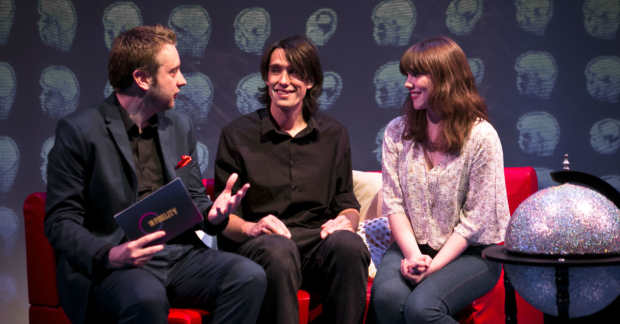Edinburgh review: In Fidelity (Traverse)
In his latest Edinburgh show, Rob Drummond tries to pair up two audience members

© Eoin Carey
What is love? Is there a scientific basis to it? That’s the starting point for Rob Drummond‘s new play In Fidelity – cutely illustrated by a game-show style set-up where two real singletons from the audience are paired on a blind date, live on stage. From answering telling first date questions to holding eye contact for a minute, might we be about to see true love blossom onstage, even as Drummond reveals the cold science behind it? Might they even live together – in fidelity – for the rest of their lives?
But in fidelity soon becomes infidelity… Because if we can explain love using science, we have to acknowledge its flipside: cheating. Drummond sweetly tells us he’s making this show for his wife Lucy, to mark 15 years since their first (awkward) date; he undergoes MRI scans that show his brain lighting up – ahhh! – at a picture of her. But the same prefrontal cortex lights up at a picture of Anna Kournikova. Love, and the thought of cheating, both throb in the same bit of brain.
And if love is just biological, a series of Darwinian impulses to prolong the human race (Darwin’s analytical approach to romance ghosts the play, Drummond casting himself as a latter-day version) then is the biological imperative to be unfaithful just as valid? Up to 76 per cent of people, we’re told, have cheated. Drummond asks tough, revealing questions of not only his date guinea pigs but also the audience: surprise, surprise, when it comes to infidelity there are more grey areas than Scottish sky in August. It makes for uncomfortable, itchy, but compelling viewing.
And a sub-plot where Drummond goes on Match.com for research, and gets into boundary-testing conversations with an attractive young woman, stretches our acceptance of such scientific justifications. Infidelity, we feel, is not OK: instinctively we root for him not to be tempted, not to stray.
Such sections also stretch credulity. True or not, this toying with unfaithfulness doesn’t seem so much strip-yourself-bare brave as just a little too glib. That said, the play frequently interrogates how much we want to know about our partners’ infidelity, and whether we’d be better off not knowing – so it is perhaps fitting that the audience are left second-guessing how much (if any) of what Drummond recounts is truly-true.
The tension between we’re-all-animals explanations for love and the sense that it can still be a magical, elevating thing doesn’t feel entirely new. But it is by turns elegantly, cheekily and challengingly laid out. And in laying bare different definitions – for love, for adultery – In Fidelity demands engagement from its audience: shifty, awkward, funny engagement. The zip and thrill of talking about true love and affairs lends In Fidelity a charge, for sure. There’s voyeuristic aspect; but while we may judge others, unless we’re saints, we judge ourselves too.
Of course, much of the show rests on the real couple. Drummond’s light-touch persona and In Fidelity‘s softly-softly structure feels set up for a cutely British, mega-awkward, Richard Curtis-style bumble-athon. The night I watch, however, two supremely confident individuals have a terrible first date, and they pretty much ride roughshod over any delicate, sensitive romantic beats in the script. But hey – that’s human beings. However much you theorise about them, they’ll always be unpredictable.
In Fidelity runs at the Traverse at various times till 28 August (except Mondays).












